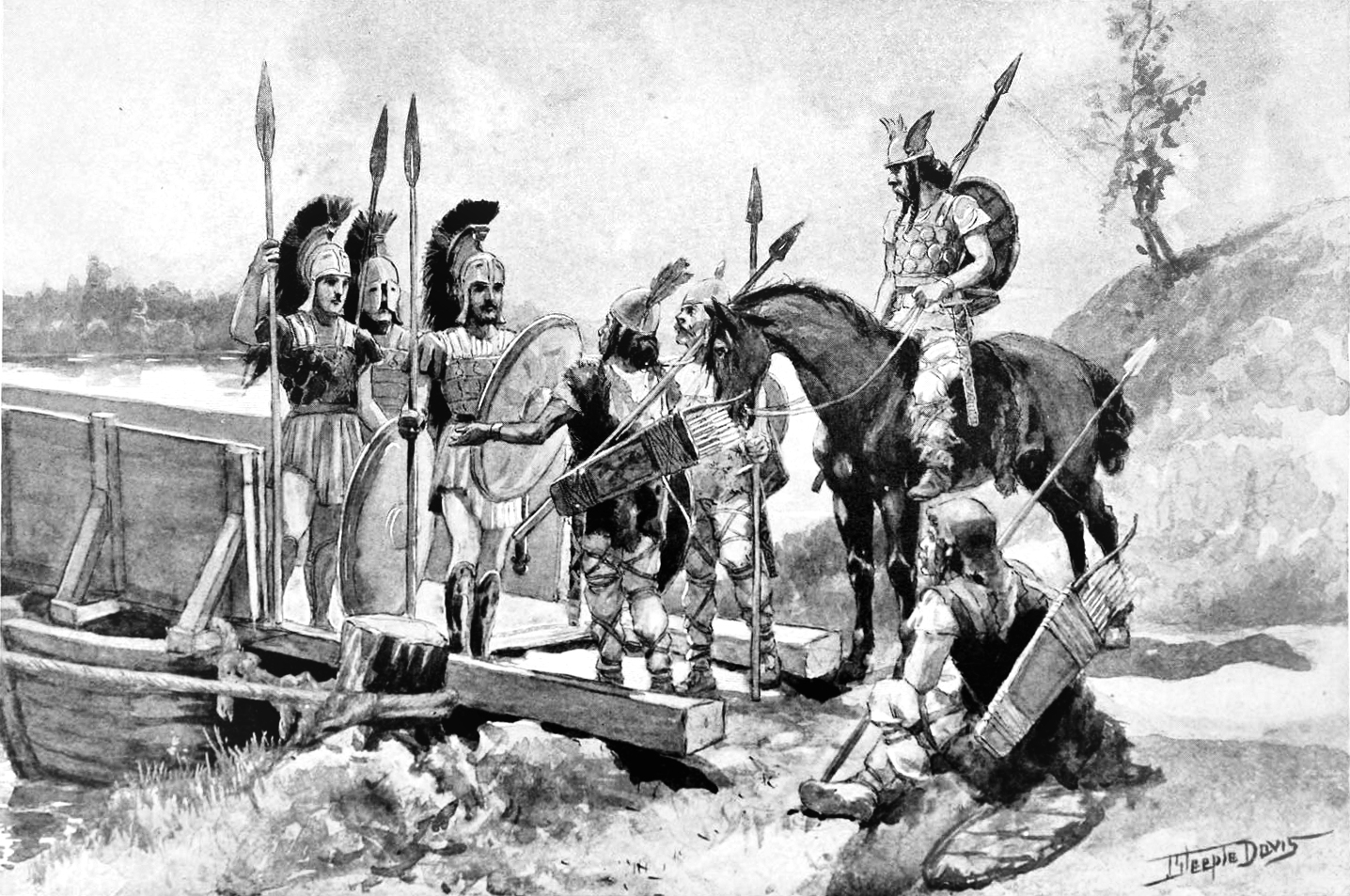The Greeks preserve the bridge of Darius by John Steeple Davis 1900
"They then sent the division of the Scythians to which the Sauromatae were attached, and which was led by Scopasis, to speak with those Ionians guarding the bridge over the Ister; as for those of the Scythians who remained behind, it was decided that they should no longer decoy the Persians, but attack them whenever they were foraging for provision. So they watched for the time when Darius' men were foraging, and did as they had planned.
When the first division of the Scythians came to the bridge—the division that had first been appointed to stand on guard by the Maeetian lake and had now been sent to the Ister to speak with the Ionians—they said, “Ionians, we have come to bring you freedom, if you will only listen to us. We understand that Darius has directed you to guard the bridge for sixty days only, and if he does not come within that time, then to go away to your homes. Now then, do what will leave you guiltless in his eyes as in ours: stay here for the time appointed; and after that, leave.” So the Ionians promised to do this, and the Scythians made their way back with all haste.
...
And as the Persian army was for the most part infantry and did not know the roads (which were not marked), while the Scythians were horsemen and knew the short cuts, they went wide of each other, and the Scythians reached the bridge long before the Persians.
There, perceiving that the Persians had not yet come, they said to the Ionians, who were in their ships, “Ionians, the days have exceeded the number, and you are wrong to be here still.
Since it was fear that kept you here, now break the bridge in haste and go, free and happy men, thanking the Gods and the Scythians. As for him that was once your master, we will leave him in such plight that never again will he lead his army against any nation.”
Then the Ionians held a council. Miltiades the Athenian, general and sovereign of the Chersonesites of the Hellespont, advised that they do as the Scythians said and set Ionia free.
But Histiaeus of Miletus advised the opposite. He said, “It is owing to Darius that each of us is sovereign of his city; if Darius' power is overthrown, we shall no longer be able to rule, I in Miletus or any of you elsewhere; for all the cities will choose democracy rather than despotism.”
When Histiaeus explained this, all of them at once inclined to his view, although they had first sided with Miltiades.
Those high in Darius' favor who gave their vote were Daphnis of Abydos, Hippoclus of Lampsacus, Herophantus of Parium, Metrodorus of Proconnesus, Aristagoras of Cyzicus, Ariston of Byzantium, all from the Hellespont and sovereigns of cities there; and from Ionia, Strattis of Chios, Aiaces of Samos, Laodamas of Phocaea, and Histiaeus of Miletus who opposed the plan of Miltiades. As for the Aeolians, their only notable man present was Aristagoras of Cymae.
When these accepted Histiaeus' view, they decided to act upon it in the following way: to break as much of the bridge on the Scythian side as a bowshot from there carried, so that they seem to be doing something when in fact they were doing nothing, and that the Scythians not try to force their way across the bridge over the Ister; and to say while they were breaking the portion of the bridge on the Scythian side, that they would do all that the Scythians desired.
This was the plan they adopted; and then Histiaeus answered for them all, and said, “You have come with good advice, Scythians, and your urgency is timely: you guide us well and we do you a convenient service; for, as you see, we are breaking the bridge, and will be diligent about it, as we want to be free.
But while we are breaking the bridge, this is your opportunity to go and find the Persians, and when you have found them, punish them as they deserve on our behalf and on your own.”
So the Scythians, trusting the Ionians' word once more, turned back to look for the Persians; but they missed the way by which their enemies returned. The Scythians themselves were to blame for this, because they had destroyed the horses' pasturage in that region and blocked the wells.
Had they not done, they could, if they had wished, easily have found the Persians. But as it was, that part of their plan which they had thought the best was the very cause of their going astray."
-Herodotus, The Histories, Book 4.128-140
 |
| The Greeks preserve the bridge of Darius by John Steeple Davis 1900. |
Source:
https://commons.wikimedia.org/wiki/File:The_Greeks_preserve_the_bridge_of_Darius.jpg
Quote:
https://penelope.uchicago.edu/Thayer/E/Roman/Texts/Herodotus/4F*.html


Comments
Post a Comment